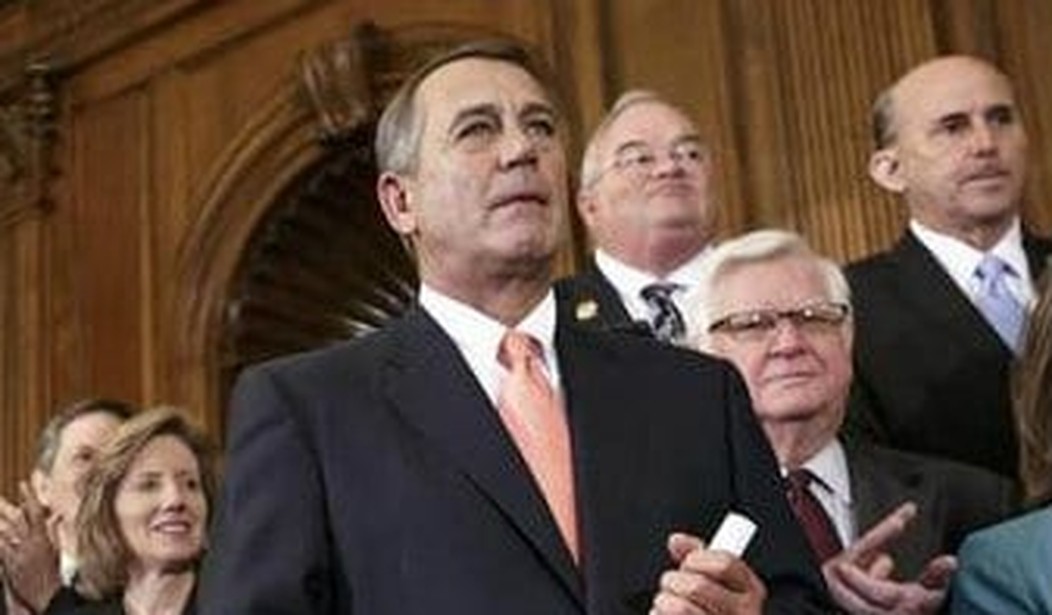WASHINGTON – America may be about to get a lesson in theoretical physics – what exactly does happen when an unstoppable force meets an immovable object?
The unstoppable force, of course, is the effort by House Republicans, spurred on by various conservatives and the Tea Party movement, to defund Obamacare in the continuing resolution needed to keep the government operating beyond the end of the federal fiscal year on Sept. 30.
The immovable object is President Obama and his Democratic allies in the Senate who insist they won’t even consider a provision in the CR that endeavors to gut the Affordable Health Care Act, the most significant achievement of Obama’s five-year term.
House Republicans took the first step Friday, delivering a spending plan that defunds Obamacare to the Senate. Only two Democrats voted for the GOP’s CR in the 230-189 vote: Reps. Jim Matheson of Utah and Mike McIntyre of North Carolina.
Senate Democratic Leader Harry Reid, of Nevada, who controls the flow of legislation to the upper chamber’s floor, wasn’t impressed. During a press conference Thursday in advance of the House vote, Reid said, “In case there is any double in the minds of our House counterparts, I want to be absolutely crystal clear — any bill that defunds Obamacare is dead. Dead.”
And that’s where things stand. If the two sides prove unable to reach a compromise by the Sept. 30 deadline, many services provided by the federal government will cease. Federal projects will be delayed, national parks will close and hundreds of thousands of government workers face temporary layoffs. The fate of Social Security checks and Veterans Administration services will be in limbo.
It’s very possible therefore that the federal government may close its doors for the first time since President Bill Clinton vetoed the spending plan dispatched to him by a Republican-led Congress in 1995. Political observers at the time maintain Clinton prevailed in the aftermath of the crisis and Republicans have been wary of the shutdown possibility ever since. But it’s also true that negotiations led to a GOP-sought balanced budget deal in 1997 and the party lost only eight House seats in the 1996 elections while picking up two Senate slots.
This time polls show the American public is poised to blame Republicans for any cessation of governmental services, basically asserting that they don’t much care for Obamacare but they don’t believe closing federal doors is worth the cost of killing it.
The impasse could be easier to resolve than it looks from the outside. The fact is House Speaker John Boehner (R-Ohio) probably already has the votes to pass a continuing resolution without killing Obamacare.
Most of the GOP insistence on a brinksmanship strategy is emanating from no more than 50 Republican lawmakers with strong Tea Party ties who have made killing healthcare reform a test of party resolve on principles. Boehner in all likelihood could muster the notes necessary to pass a CR excluding the Obamacare defund by combining those Republicans uneasy about shutting down the government with House Democrats.
But Boehner is unwilling to take that giant step. He has opted to impose the so-called Hastert Rule in the handling of continuing resolution votes – only those measures that carry the support of the majority of the House Republican caucus will be considered on the lower chamber floor.
The decision to impose Hastert – named after former House Speaker Denny Hastert, an Illinois Republican who informally adopted the rule during his tenure in the 1990s – has left Boehner without an escape hatch. If he sticks to the rule, the federal government is likely to be shut down. If he reverses course, his time as speaker of the House of Representatives is likely over with back-bench conservatives wailing for his ouster.
In his defense, Boehner hasn’t received a lot of help from Senate conservatives, like Sen. Ted Cruz (R-Texas) and Sen. Mike Lee (R-Utah), who have been goading lower chamber lawmakers into standing firm against Obamacare and praising them for passing a CR to kill it. Their endeavors forced Boehner, who initially opposed any confrontation that could result in a shutdown, to change course and endorse the strategy.
Now those same Senate Republicans are saying there’s little they can do to halt the Obamacare juggernaut, although they wish House Republicans the best in their continued efforts.
Cruz on Wednesday acknowledged that Reid “will no doubt try to strip the defund language from the continuing resolution, and right now he likely has the votes to do so. At that point, House Republicans must stand firm, hold their ground and continue to listen to the American people.”
In some quarters, it sounded like Cruz, Lee and others were leaving Boehner holding the bag – a bag he initially didn’t even care to hold. Stung by criticism for his curious tactics, Cruz is now promising to do everything at his disposal to kill Obamacare – including staging a talking filibuster on the floor.
But the Senate may ultimately have the 60 votes necessary to overcome delaying tactics and pass a continuing resolution similar to the House measure — sans the defunding of Obamacare.
At some point, then, Boehner will have to consider abandoning the Hastert Rule – and in all likelihood the speakership – in order to get a deal done unless he somehow convinces a majority of his caucus to go along with the Senate. Thus far during his tenure as the head of the lower chamber, Boehner hasn’t exhibited great talent for swaying wayward lawmakers unless you consider the recent vote on the agriculture appropriations bill a great triumph.
Or he can convince them to abandon the fight and take up killing Obamacare again within the next few weeks when Congress debates raising the debt limit, which could develop into yet another unstoppable force vs. immovable object showdown.









Join the conversation as a VIP Member